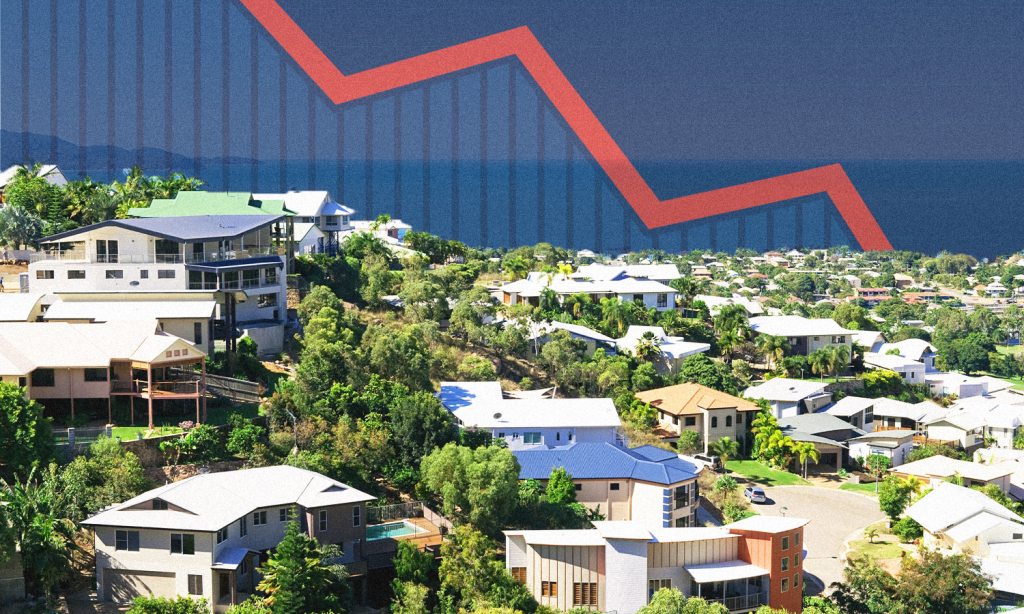Documents accessed by the Australian Financial Review from the Reserve Bank of Australia have shown that house prices could tumble 20% over the coming two years.
The previously secret modelling, conducted by Australia’s independent financer, suggests that the Australian housing market could be in a far more precarious position than many imagined.
People becoming increasingly pessimistic about the property market — due in part to rising interest rates and downward momentum carrying the market south — are some of the factors the RBA cite in their analysis. Surely headlines like these couldn’t be contributory factors, could they?
The new modelling was conducted after the RBA was caught off-guard by slumping house prices in June, something they hadn’t predicted, given that it happened before interest rates could start impacting household budgets.
The 20% figure is “roughly twice as large as what we’ve assumed in our baseline,” the document reads, although the modelling gives a spread as to where prices could end up, with a 1.5% decline per month being the most optimistic scenario. In this case, property prices would be down by 11% by the end of next year.
Capital cities, starting with Sydney and Melbourne, are likely to be impacted first, with regional areas to follow. Indeed house prices in Sydney are already down 6.1% in the past three months, according to recent data from CoreLogic.
So, what exactly do these figures mean? Is this the end of days for homeowners? Are prospective buyers right to be dancing with joy in the streets? We spoke to veteran property journalist and financial expert at Finder, Sarah Megginson, to get the low down.
Don’t Panic
“It’s modelling, it’s not a prediction,” Megginson said.
“These types of numbers get thrown around and can be very scary, but there’s a very big difference between modelling and predicting”.
Modelling, Megginson explains, is simply looking at the possible outcomes if a range of factors line up. That 20% decline is one possible outcome, but it’s not guaranteed.
“Back when the GFC first started, a number of really smart economists did some modelling and predicted that property prices could drop up to 32%. That’s not what happened”.
The other point Megginson is keen to make is that not all cities and markets will be affected in the same way over the coming years, even if this modelling does play out.
“It doesn’t mean we’re going to see a broad stroke 20% decline across the market,” she said.
Taking the Broad View
“The economy is always trying to write itself back to an even keel. So, this will be a pretty tough couple of years but it’s really impossible to predict exactly what’s going to happen”.
Property prices, particularly in capital cities, are on a major two-year high, with prices climbing by as much as $1,200 per day during the pandemic. This potential oncoming slump needs to be viewed in broader terms, argues Megginson, as the market is always on an upward trend.
“In a perfect world, we would all love to buy property at the bottom of the market and pay the lowest price we can.”
“Ten years ago, you could buy an apartment in some of Sydney’s sought-after areas for well under a million dollars. Now, most of those suburbs are well over a million.
“It’s going to change over the next couple of years. But it’s also going to change over the next five years.”
What Should Homeowners Be Doing?
Increasing interest rates and the declining value of a home might be making some owners nervous if they feel they’re losing value in their asset that’s now costing them more.
If this is you, Megginson suggests looking through your own finances to see exactly how the changes might affect you and what you can do to counter them.
“I would suggest you block out these predictions if they’re causing you stress and instead just really focus on your own situation.
“Can you afford your mortgage now and can you afford it longer term? If interest rates continue to go up, and holding on to the mortgage it does become more difficult for you, what are your exit strategies? What are your options to help you manage your mortgage? Have you spoken to your bank about the options for a repayment holiday or to renegotiate your debt over a longer period to make your payments a bit lower?
“It might be worth refinancing at a lower interest rate to save a bit of money. It’s a very competitive market at the moment, so you might even be able to find a deal where you refinance to a bank that’s willing to offer you cashback of between $2,000 and $5,000. You could get $5,000 for refinancing and a better rate.
“I would just keep really focused on what the options are for you just to make this more manageable rather than worrying too much about what might happen in the future.”
Related: How COVID Has Impacted the Housing Crisis, Leaving More People Than Ever Living With Parents
Related: Rising Interest Rates Could Crush the Housing Market, and Millennials Aren’t Mad About It
Read more stories from The Latch and subscribe to our email newsletter.

